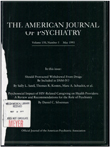Long-term outcome of antidepressant treatment for bulimia nervosa
Abstract
OBJECTIVE: The purpose of this study was 1) to replicate previous work indicating that antidepressant medication is superior to placebo in the treatment of bulimia nervosa and 2) to assess the long-term efficacy of this form of treatment. METHOD: Eighty patients entered a three-phase treatment protocol. An 8-week double-blind initiation phase was used to compare the effects of desipramine and placebo. Patients who responded satisfactorily to desipramine entered a 16-week maintenance phase. Patients who remained well were then randomly assigned to either desipramine or placebo for 6 additional months (discontinuation phase). The primary outcome measure was binge frequency, which was assessed weekly by self-report diaries. RESULTS: In the initiation phase the superiority of desipramine over placebo in reducing binge frequency was demonstrated. Patients treated with desipramine had a mean reduction in binge frequency of 47% at termination, whereas patients taking placebo experienced a mean increase of 7%. Less than half of the patients treated with desipramine met the criteria for entering the maintenance phase, and 29% of the patients entering that phase relapsed in the following 4 months. There were not enough patients in the discontinuation phase to permit clear conclusions about the need for continued antidepressant medication after 6 months of treatment. CONCLUSIONS: The study documents a beneficial effect of desipramine in the treatment of bulimia nervosa when compared to placebo. However, limited improvement and considerable relapse with continued treatment suggest serious limitations to the long-term efficacy of a single antidepressant trial in treating bulimia nervosa.
Access content
To read the fulltext, please use one of the options below to sign in or purchase access.- Personal login
- Institutional Login
- Sign in via OpenAthens
- Register for access
-
Please login/register if you wish to pair your device and check access availability.
Not a subscriber?
PsychiatryOnline subscription options offer access to the DSM-5 library, books, journals, CME, and patient resources. This all-in-one virtual library provides psychiatrists and mental health professionals with key resources for diagnosis, treatment, research, and professional development.
Need more help? PsychiatryOnline Customer Service may be reached by emailing [email protected] or by calling 800-368-5777 (in the U.S.) or 703-907-7322 (outside the U.S.).



